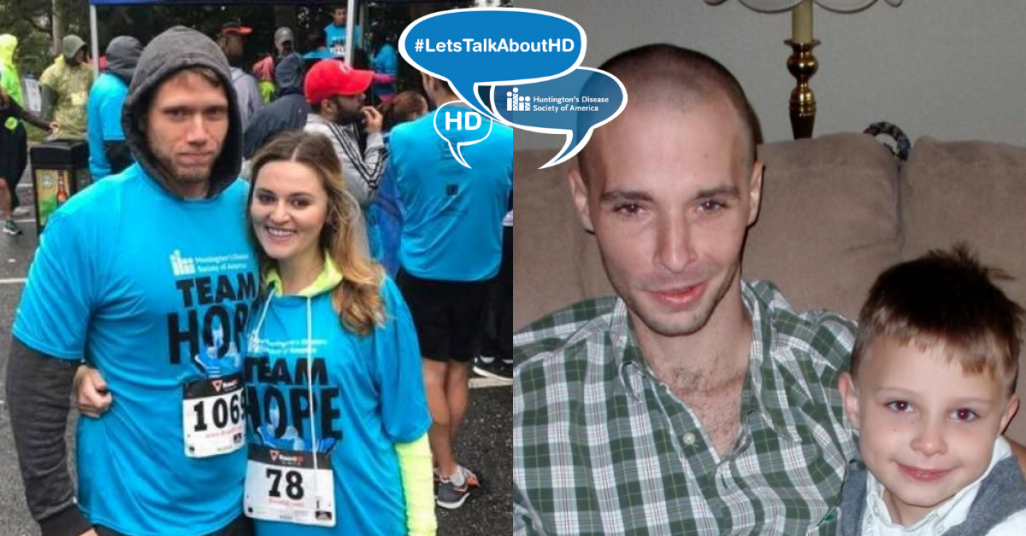
By Matthew Santamaria (msantamaria@hdsa.org)
NOTE: The following story discusses the topic of suicide. If you are feeling suicidal or have suicidal thoughts, visit the National Suicide Prevention Lifeline or call 1-800-273-8255.
Philadelphia resident Mark Adler can run long distances. However, Mark cannot run from Huntington’s disease (HD).
HD is a fatal genetic disorder that causes the progressive breakdown of nerve cells in the brain. It deteriorates a person’s physical and mental abilities during their prime working years and has no cure.
Mark’s HD journey begins with his grandfather. When his grandfather passed away, his mother thought that he had cancer but it was later known that this was not the case.

After his uncle was diagnosed, a few years later, his father was diagnosed as well. At the time, Mark did not know the severity of the disease as he thought it was similar to Parkinson’s disease. However, he learned more about HD and found this was not the case which made him feel overwhelmed.
The symptoms of HD are described as having ALS, Parkinson’s and Alzheimer’s – simultaneously. Symptoms include personality changes, mood swings, depression, forgetfulness, impaired judgment, unsteady gait, involuntary movements, slurred speech, difficulty in swallowing, and significant weight loss.
At the time, Mark was debating getting tested for HD but was not ready. Every child of a parent with HD has a 50/50 chance of inheriting the faulty gene. Mark and his brothers were at risk.
The decision to get genetically tested is difficult to make. Each year, 5-10% are tested. It is never the right or wrong decision to be tested. There are people that see no benefit in knowing that they will develop the disease while others want to know in order to make informed choices about their future. It can take up to several weeks to receive your results from the genetic testing center.
In 2013, Mark’s father passed away. However, the HD journey was not over yet.
Mark decided to get tested for HD because he was at the crossroads of people getting sick around him. He has cousins and brothers with HD. Mark would go to the University of Pennsylvania. This is one of the HDSA Centers of Excellence that provides an elite team approach to HD care and research. Professionals have extensive experience working with families affected by HD and work together to provide families with the best HD care program.
Mark started to have some involuntary movements and would test positive for HD.
One of his brothers took the news very hard and would develop more of mental symptoms of HD. This includes picking up his shirt repeatedly, becoming obsessive, and acting out of control. According to Mark, he would do drugs off and on. He also had ticks. He would later take his own life.
The unsung hero in the family HD journey is Mark’s mother. She was the HD caregiver for the entire family. According to Mark, she went through a lot mentally and it would take a toll on her. She would deal with heart issues and passed away.
Mark has a message for the HD Community:
“Keep a good attitude. Focus on what is important in your life. You need to take the time
to educate yourself and be proactive about HD before getting tested.”
###
Huntington’s disease (HD) is a fatal genetic disorder that causes the progressive breakdown of nerve cells in the brain. It deteriorates a person’s physical and mental abilities during their prime working years and has no cure. Every child of a parent with HD has a 50/50 chance of inheriting the faulty gene. Today, there are approximately 41,000 symptomatic Americans and more than 200,000 at-risk of inheriting the disease. The symptoms of HD are described as having ALS, Parkinson’s and Alzheimer’s – simultaneously.
The Huntington’s Disease Society of America is the premier nonprofit organization dedicated to improving the lives of everyone affected by HD. From community services and education to advocacy and research, HDSA is the world’s leader in providing help for today and hope for tomorrow for people with HD and their families.
HDSA was founded in 1967 by Marjorie Guthrie, the wife of legendary folk singer Woody Guthrie. Woody died from HD complications when he was only 55 years old, but the Guthrie family legacy lives on at HDSA to this day.
To learn more about Huntington’s disease and the work of the Huntington’s Disease Society of America, visit www.HDSA.org or call 1(800)345-HDSA.
This is a story featuring a personal experience with Huntington’s disease. If you would like to have your story told please contact Matthew Santamaria at msantamaria@hdsa.org
NOTE: The following story discusses the topic of suicide. If you are feeling suicidal or have suicidal thoughts, visit the National Suicide Prevention Lifeline or call 1-800-273-8255.
Philadelphia resident Mark Adler can run long distances. However, Mark cannot run from Huntington’s disease (HD).
HD is a fatal genetic disorder that causes the progressive breakdown of nerve cells in the brain. It deteriorates a person’s physical and mental abilities during their prime working years and has no cure.
Mark’s HD journey begins with his grandfather. When his grandfather passed away, his mother thought that he had cancer but it was later known that this was not the case.

After his uncle was diagnosed, a few years later, his father was diagnosed as well. At the time, Mark did not know the severity of the disease as he thought it was similar to Parkinson’s disease. However, he learned more about HD and found this was not the case which made him feel overwhelmed.
The symptoms of HD are described as having ALS, Parkinson’s and Alzheimer’s – simultaneously. Symptoms include personality changes, mood swings, depression, forgetfulness, impaired judgment, unsteady gait, involuntary movements, slurred speech, difficulty in swallowing, and significant weight loss.
At the time, Mark was debating getting tested for HD but was not ready. Every child of a parent with HD has a 50/50 chance of inheriting the faulty gene. Mark and his brothers were at risk.
The decision to get genetically tested is difficult to make. Each year, 5-10% are tested. It is never the right or wrong decision to be tested. There are people that see no benefit in knowing that they will develop the disease while others want to know in order to make informed choices about their future. It can take up to several weeks to receive your results from the genetic testing center.
In 2013, Mark’s father passed away. However, the HD journey was not over yet.
Mark decided to get tested for HD because he was at the crossroads of people getting sick around him. He has cousins and brothers with HD. Mark would go to the University of Pennsylvania. This is one of the HDSA Centers of Excellence that provides an elite team approach to HD care and research. Professionals have extensive experience working with families affected by HD and work together to provide families with the best HD care program.
Mark started to have some involuntary movements and would test positive for HD.
One of his brothers took the news very hard and would develop more of mental symptoms of HD. This includes picking up his shirt repeatedly, becoming obsessive, and acting out of control. According to Mark, he would do drugs off and on. He also had ticks. He would later take his own life.
The unsung hero in the family HD journey is Mark’s mother. She was the HD caregiver for the entire family. According to Mark, she went through a lot mentally and it would take a toll on her. She would deal with heart issues and passed away.
Mark has a message for the HD Community:
“Keep a good attitude. Focus on what is important in your life. You need to take the time
to educate yourself and be proactive about HD before getting tested.”
###
Huntington’s disease (HD) is a fatal genetic disorder that causes the progressive breakdown of nerve cells in the brain. It deteriorates a person’s physical and mental abilities during their prime working years and has no cure. Every child of a parent with HD has a 50/50 chance of inheriting the faulty gene. Today, there are approximately 41,000 symptomatic Americans and more than 200,000 at-risk of inheriting the disease. The symptoms of HD are described as having ALS, Parkinson’s and Alzheimer’s – simultaneously.
The Huntington’s Disease Society of America is the premier nonprofit organization dedicated to improving the lives of everyone affected by HD. From community services and education to advocacy and research, HDSA is the world’s leader in providing help for today and hope for tomorrow for people with HD and their families.
HDSA was founded in 1967 by Marjorie Guthrie, the wife of legendary folk singer Woody Guthrie. Woody died from HD complications when he was only 55 years old, but the Guthrie family legacy lives on at HDSA to this day.
To learn more about Huntington’s disease and the work of the Huntington’s Disease Society of America, visit www.HDSA.org or call 1(800)345-HDSA.
This is a story featuring a personal experience with Huntington’s disease. If you would like to have your story told please contact Matthew Santamaria at msantamaria@hdsa.org
